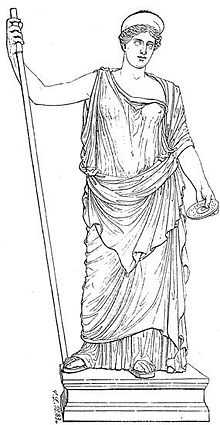Heraean Games
![]()
The title of this article is ambiguous. For the ancient city of the same name, see Heraia (Arcadia).
The Heraia (ancient Greek Ἡραῖα, also Heraea or Heraia) were celebrations in ancient Greece in honor of Hera, the preserver of marriage and goddess of women. They were held in several Greek cities from the 6th century BC until the Roman imperial period.
Most famous were the Heraia in Argos, the most important cult center of Hera, where she was also city goddess and the years were named after her priestesses. Here Demetrios Poliorketes personally took charge of the games and Alexander the Great's father, Philip II of Macedonia, acted as referee. The priestess of the cult of Hera rode to the Heraion of Argos in a chariot drawn by four white oxen, and was accompanied in solemn procession by the people and the brawling crew in arms. A great bull sacrifice was followed by a general sacrificial feast and the contests.
Boys and men participated in the games, which took place at the time of Pausanias in the stadium also used for the Nemeen. The games had partly a martial character - for example the fighters hurled throwing spears at a shield set up as a target - but furthermore consisted of gymnastic and musical agons in which also heralds and rhetors took part. The main prize for the winners in each discipline was an argivian shield and a myrtle wreath.
Also significant were the Heraia, which were celebrated in Samos and were connected with the cult in Argos. Here, too, the male participants appeared in arms, and there were gymnastic and musical contests. In addition, the Hieros gamos, the Holy Wedding, between Hera and Zeus was reenacted.
Also in Olympia there was a festival under the name of Heraia, which was held every four years, probably before the Olympic Games. The only preserved description of this festival is found in the travelogue of Pausanias.
At the center of the celebrations was a women's sports festival, the highlight of which was a race over 160 meters. Unlike the competitors in the Olympic Games, the participants in the festival in honor of Hera were clothed, with the exception that the right breast was exposed. The winners received olive tree wreaths and parts of a cow sacrificed to Hera. Only unmarried virgins were allowed to participate in the sports festival.
Other Heraia were also celebrated at Delphi, at Aegina, at Stratonikeia in Caria, and at other places.

goddess Hera
Search within the encyclopedia